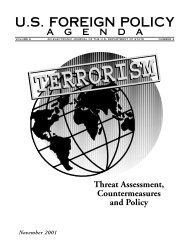Working for Women Worldwide - Embassy of the United States
Working for Women Worldwide - Embassy of the United States
Working for Women Worldwide - Embassy of the United States
Create successful ePaper yourself
Turn your PDF publications into a flip-book with our unique Google optimized e-Paper software.
In Eastern Europe, <strong>the</strong> desire to join <strong>the</strong><br />
European Union and <strong>the</strong> North Atlantic Treaty<br />
Organization (NATO) also has been an incentive <strong>for</strong><br />
governments to develop national action plans and to<br />
pass legislation against human trafficking. A number<br />
<strong>of</strong> countries in <strong>the</strong> region have demonstrated <strong>the</strong><br />
importance <strong>the</strong>y place on fighting this scourge by<br />
including references to <strong>the</strong>ir ef<strong>for</strong>ts in <strong>the</strong>ir <strong>of</strong>ficial<br />
country statements at <strong>the</strong> 2003 and 2004 U.N.<br />
Commission on Human Rights.<br />
Educating people and raising awareness <strong>of</strong> <strong>the</strong><br />
human rights problem has led to helpful research and<br />
programs to assist <strong>for</strong>mer<br />
victims. Research<br />
in Ukraine has shown<br />
that 33 percent <strong>of</strong> <strong>the</strong><br />
women trafficked had<br />
previously been victims<br />
<strong>of</strong> domestic violence.<br />
The lack <strong>of</strong> jobs, <strong>the</strong><br />
need to provide <strong>for</strong><br />
dependent family members,<br />
and <strong>the</strong> lure <strong>of</strong><br />
nearby countries with<br />
higher standards <strong>of</strong> living<br />
made many women<br />
perfect prey <strong>for</strong> traffickers<br />
promising employment<br />
and travel abroad.<br />
One remedy: A<br />
U.S. Agency <strong>for</strong> International<br />
Development (USAID) project in Ukraine<br />
with Winrock International, a nongovernmental<br />
organization (NGO) working with <strong>the</strong> poor in many<br />
countries, has established trafficking prevention centers<br />
where victims can seek job training as well as crisis<br />
counseling. Similar projects have started in Russia,<br />
Belarus, and Moldova.<br />
Ano<strong>the</strong>r nongovernmental organization, La<br />
Strada, developed a handbook <strong>for</strong> telephone hotline<br />
workers. It provides in<strong>for</strong>mation on various kinds <strong>of</strong><br />
work visas, international labor agreements, job contracts,<br />
consular telephone numbers to call in Ukraine<br />
and abroad, and what to do and where to go if an individual<br />
or a family member becomes a victim. USAID<br />
has supported hotlines in many countries <strong>of</strong> <strong>the</strong><br />
Europe and Eurasia region, including most recently in<br />
<strong>the</strong> Kyrgyz Republic.<br />
USAID-funded training institutes have begun to<br />
focus on two o<strong>the</strong>r important groups: journalists and<br />
law en<strong>for</strong>cement. After two days <strong>of</strong> training, reporters<br />
have typically revised <strong>the</strong>ir approach to <strong>the</strong> subject,<br />
treating it more seriously and less sensationally in spite<br />
<strong>of</strong> <strong>the</strong> danger involved. (In 2003, several journalists<br />
who had been reporting on trafficking and corruption<br />
in Uzbekistan and Montenegro were killed under suspicious<br />
circumstances.)<br />
Law en<strong>for</strong>cement training, based on a manual<br />
created by <strong>the</strong> <strong>United</strong> Nations Development Programme<br />
and <strong>the</strong> International Center <strong>for</strong> Migration<br />
Policy Development, has<br />
educated police, prosecutors,<br />
and judges on<br />
how to handle human<br />
trafficking cases and<br />
how to identify and protect<br />
victims. Training<br />
also raised awareness <strong>of</strong><br />
<strong>the</strong> deep link between<br />
trafficking and corruption.<br />
Programs, notably<br />
in Central Asia, have<br />
emphasized <strong>the</strong> importance<br />
<strong>of</strong> regional cooperation<br />
between governments<br />
and NGOs,<br />
and on <strong>the</strong> training <strong>of</strong><br />
border guards and consular<br />
<strong>of</strong>ficials.<br />
And, most recently, <strong>the</strong> <strong>United</strong> <strong>States</strong> is assisting<br />
Romania in developing a victim-witness coordinator<br />
program based on U.S. experience, which hopefully<br />
will lead to training modules that can be applied<br />
throughout <strong>the</strong> region.<br />
Z<br />
Above, teenage girls at a Moldovan orphanage <strong>for</strong> abandoned<br />
children. International organizations like UNICEF are working<br />
to prevent <strong>the</strong>se children, seen as <strong>the</strong> most vulnerable to traffickers,<br />
from becoming victims <strong>of</strong> this scourge.<br />
57












